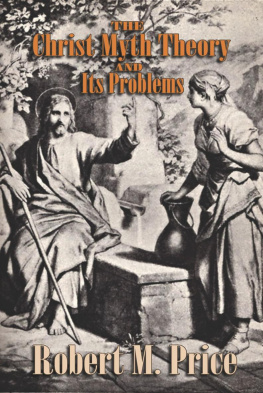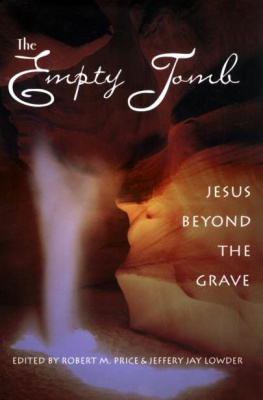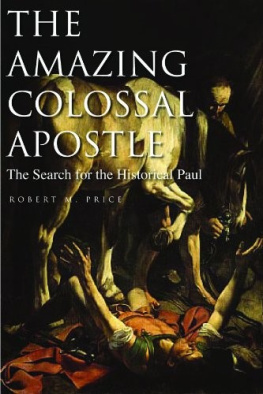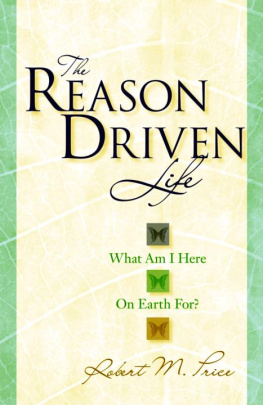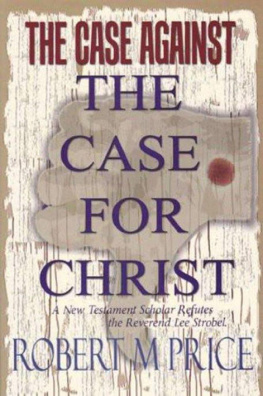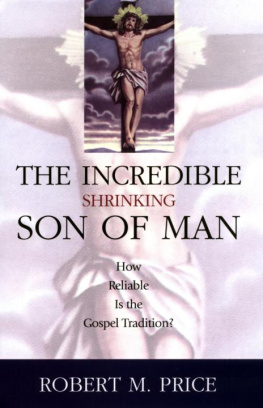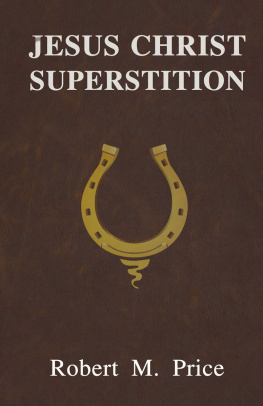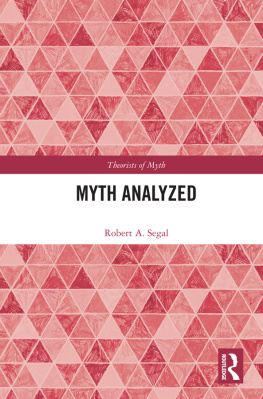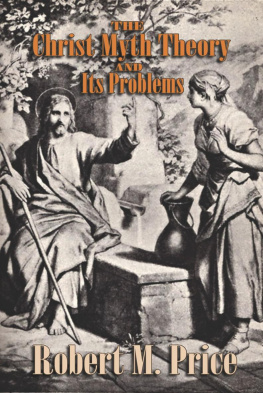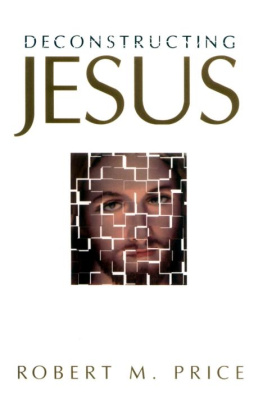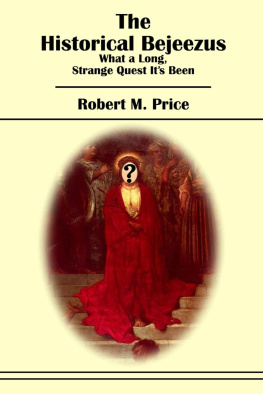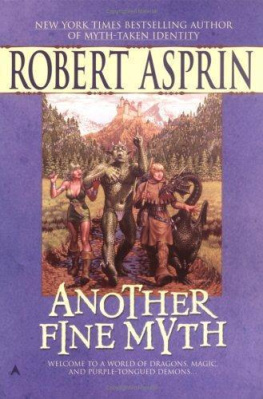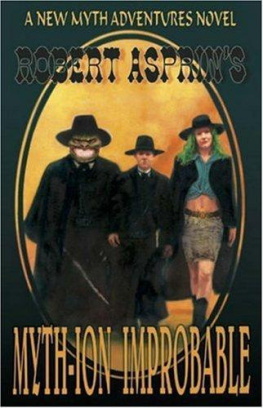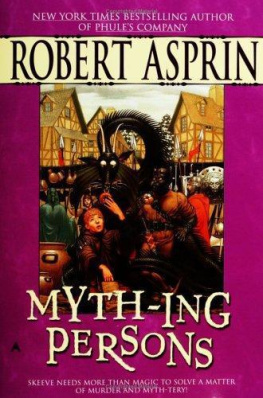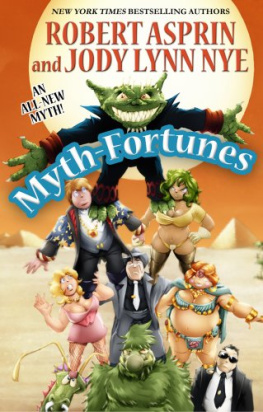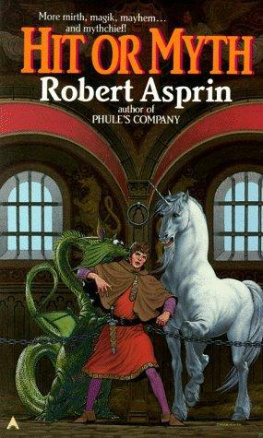Robert M. Price - The Christ-Myth Theory and Its Problems
Here you can read online Robert M. Price - The Christ-Myth Theory and Its Problems full text of the book (entire story) in english for free. Download pdf and epub, get meaning, cover and reviews about this ebook. year: 2011, publisher: American Atheist Press, genre: Religion. Description of the work, (preface) as well as reviews are available. Best literature library LitArk.com created for fans of good reading and offers a wide selection of genres:
Romance novel
Science fiction
Adventure
Detective
Science
History
Home and family
Prose
Art
Politics
Computer
Non-fiction
Religion
Business
Children
Humor
Choose a favorite category and find really read worthwhile books. Enjoy immersion in the world of imagination, feel the emotions of the characters or learn something new for yourself, make an fascinating discovery.
- Book:The Christ-Myth Theory and Its Problems
- Author:
- Publisher:American Atheist Press
- Genre:
- Year:2011
- Rating:4 / 5
- Favourites:Add to favourites
- Your mark:
- 80
- 1
- 2
- 3
- 4
- 5
The Christ-Myth Theory and Its Problems: summary, description and annotation
We offer to read an annotation, description, summary or preface (depends on what the author of the book "The Christ-Myth Theory and Its Problems" wrote himself). If you haven't found the necessary information about the book — write in the comments, we will try to find it.
The Christ-Myth Theory and Its Problems — read online for free the complete book (whole text) full work
Below is the text of the book, divided by pages. System saving the place of the last page read, allows you to conveniently read the book "The Christ-Myth Theory and Its Problems" online for free, without having to search again every time where you left off. Put a bookmark, and you can go to the page where you finished reading at any time.
Font size:
Interval:
Bookmark:
Contents
The Christ-Myth Theory And Its Problems
ROBERT M. PRICE
The Christ-Myth Theory
And Its Problems

2011
American Atheist Press
Cranford, New Jersey
ISBN10: 1-57884-017-1
ISBN13: 978-1-57884-017-5
American Atheist Press
225 Cristiani Street
Cranford, NJ 07016
Voice: (908) 276-7300
FAX: (908) 276-7402
www.atheists.org
Copyright 2011 by American Atheist Press, all rights reserved. No part of this publication may be reproduced, stored in a retrieval system, or transmitted in any form or by any means, electronic, mechanical, photocopying, recording, or otherwise, without prior written permission of the publisher, except in the case of brief quotations embodied in critical articles and reviews.
Library of Congress Cataloging-in-Publication Data
Price, Robert M., 1954-
The Christ-myth theory and its problems / Robert M. Price.
p. cm.
ISBN 978-1-57884-017-5 (alk. paper)
1. Jesus ChristMythological interpretations. I. Title.
BT303.2.P74 2011
232.9dc23
2011028064
Dedication
To Hermann Detering
the greatest New Testament scholar of his generation
Acknowledgements
The Quest of the Mythical Jesus first appeared on the Robert M. Price Myspace page.
Jesus at the Vanishing Point was originally printed in The Historical Jesus: Five Views edited by James Beilby and Paul R. Eddy. Copyright 2009, James K. Beilby and Paul Rhodes Eddy. Used by permission of Inter-Varsity Press, PO Box 1400 Downers Grove, IL 60515. www.ivpress.com.
New Testament Narrative as Old Testament Midrash originally appeared in Jacob Neusner and Alan J. Avery Peck (eds.), Encyclopaedia of Midrash: Biblical Interpretation in Formative Judaism (E.J. Brill, 2005).
Dubious Database: Second Thoughts on the Red and Pink Materials of the Jesus Seminar first appeared in CSER Review (1/2) Winter/Spring 2006/07 .
The Abhorrent Void was originally published in Sources of the Jesus Tradition: Separating History from Myth , edited by R. Joseph Hoffmann (Amherst, NY: Prometheus Books, 2010), pp. 109-117; www.prometheusbooks.com.
James the Just: Achilles Heel of the Christ Myth Theory? was delivered as a paper at the Committee for the Scientific Examination of Religion Conference: Scripture and Skepticism Conference, Davis, CA. January 25-28, 2007.
Does the Christ Myth Theory Require an Early Date for the Pauline Epistles? first appeared in Thomas L. Thompson and Thomas Verenna, eds., Is This Not the Carpenter? The Question of the Historicity of the Figure of Jesus . Copenhagen International Seminar (Sheffield: Equinox Publishing, 2012).
Revisiting the Pre-Christian Jesus appears here for the first time.
Worse Than Atheism was delivered as a paper at the CFI Religion Under Examination conference, February 20, 2010. { }
PDF and ebook versions by John F. Felix, jffelix61@att.net
Introduction: The Quest of the Mythical Jesus17
When, long ago, I first learned that some theorized that Jesus had never existed as an historical figure, I dismissed the notion as mere crankism, as most still do. Indeed, Rudolf Bultmann, supposedly the arch-skeptic, quipped that no sane person could doubt that Jesus existed (though he himself came surprisingly close to the same opinion, as did Paul Tillich). For a number of years I held a more or less Bultmannian estimate of the historical Jesus as a prophet heralding the arrival of the eschatological Kingdom of God, an end to which his parables, faith healings and exorcisms were directed. Jesus had, I thought, predicted the coming of the Son of Man, an angelic figure who should raise the dead and judge mankind. When his cleansing of the temple invited the unforgiving ire of the Sadducee establishment, in cahoots with the Romans, he sealed his own doom. He died by crucifixion, and a few days later his disciples began experiencing visions of him raised from the dead. They concluded that he himself was now to be considered the Son of Man, and they expected his messianic advent in the near future.
From this eminently reasonable position (its cogency reinforced by the postmortem unfolding of the messiahship of Lubavitcher Rebbe Menachem Mendel Schneerson) I eventually found myself gravitating to that crazy view, that Jesus hadnt existed, that he was mythic all the way down, like Hercules. I do not hold it as a dogma. I do not prefer that it be true. It is just that the evidence now seems to me to point that way. The burden of proof would seem to belong with those who believe there was an historical man named Jesus. I fully admit and remind the reader that all historical hypotheses are provisional and tentative. This one certainly is. And yet I do favor it. Why? {}
I remember first encountering the notion that the Jesus saga was formally similar to the Mediterranean dying and rising god myths of saviors including Attis, Adonis, Tammuz/Dumuzi, Dionysus, Osiris, and Baal. I felt almost at once that the jig was up. I could not explain away those parallels, parallels that went right to the heart of the thing. I felt momentary respite when I read the false reassurances of Bruce M. Metzger (may this great man rest in peace), J.N.D. Anderson, Edwin Yamauchi (may I someday gain a tenth of his knowledge!), and others that these parallels were false or that they were later in origin, perhaps even borrowed by the pagans from Christianity. But it did not take long to discover the spurious nature of such apologetical special pleading. There was ample and early pre-Christian evidence for the dying and rising gods. The parallels were very close. And it was simply not true that no one ever held that, like Jesus, these saviors had been historical figures. And if the ancient apologists had not known that the pagan parallels were pre-Christian, why on earth would they have mounted a suicidal argument that Satan counterfeited the real dying and rising god ahead of time . That is like the fundamentalists of the nineteenth century arguing desperately that God created fossils of dinosaurs that had never existed.
And, yet, all of this scarcely proved that Jesus had not existed at all. Bultmann freely admitted that such myths clothed and shaped the form of resurrection belief among the early Christians, but he felt there had actually been certain Easter morning experiences, visions that might have given rise to a different explanation in a different age. I now think Bultmanns argument runs afoul of Ockhams razor, since it posits redundant explanations. If you recognize the recurrence of the pagan savior myth in the Christian proclamation, then no need remains to suggest an initial Big Bang (Burton L. Mack) of an Easter Morning Experience of the First Disciples.
G.A. Wells, like his predecessors advocating the Christ Myth theory, discounted the gospel story of an historical Jesus, an itinerant {} teacher and miracle worker, on the grounds of its seeming absence from the Epistle literature, earlier than the gospels, implying that there was no Jesus tradition floating around in either oral or written form at the time Paul and Peter were writing letters. All they referred to was a supernatural Son of God who descended from heaven to vanquish the evil angels ruling the world, then returned heavenward to reign in divine glory till his second advent. Had Paul known of the teaching of Jesus, why did he not quote it when it would have settled this and that controversial question ( e.g ., paying Roman taxes, celibacy for the Kingdom, congregational discipline)? Why does he seem to refer to occasional commands of the Lord in a manner so vague as to suggest charismatic revelations to himself? Why does he never mention Jesus having healed the sick or done miracles? How can he say the Roman Empire never punishes the righteous, only the wicked?
Next pageFont size:
Interval:
Bookmark:
Similar books «The Christ-Myth Theory and Its Problems»
Look at similar books to The Christ-Myth Theory and Its Problems. We have selected literature similar in name and meaning in the hope of providing readers with more options to find new, interesting, not yet read works.
Discussion, reviews of the book The Christ-Myth Theory and Its Problems and just readers' own opinions. Leave your comments, write what you think about the work, its meaning or the main characters. Specify what exactly you liked and what you didn't like, and why you think so.

